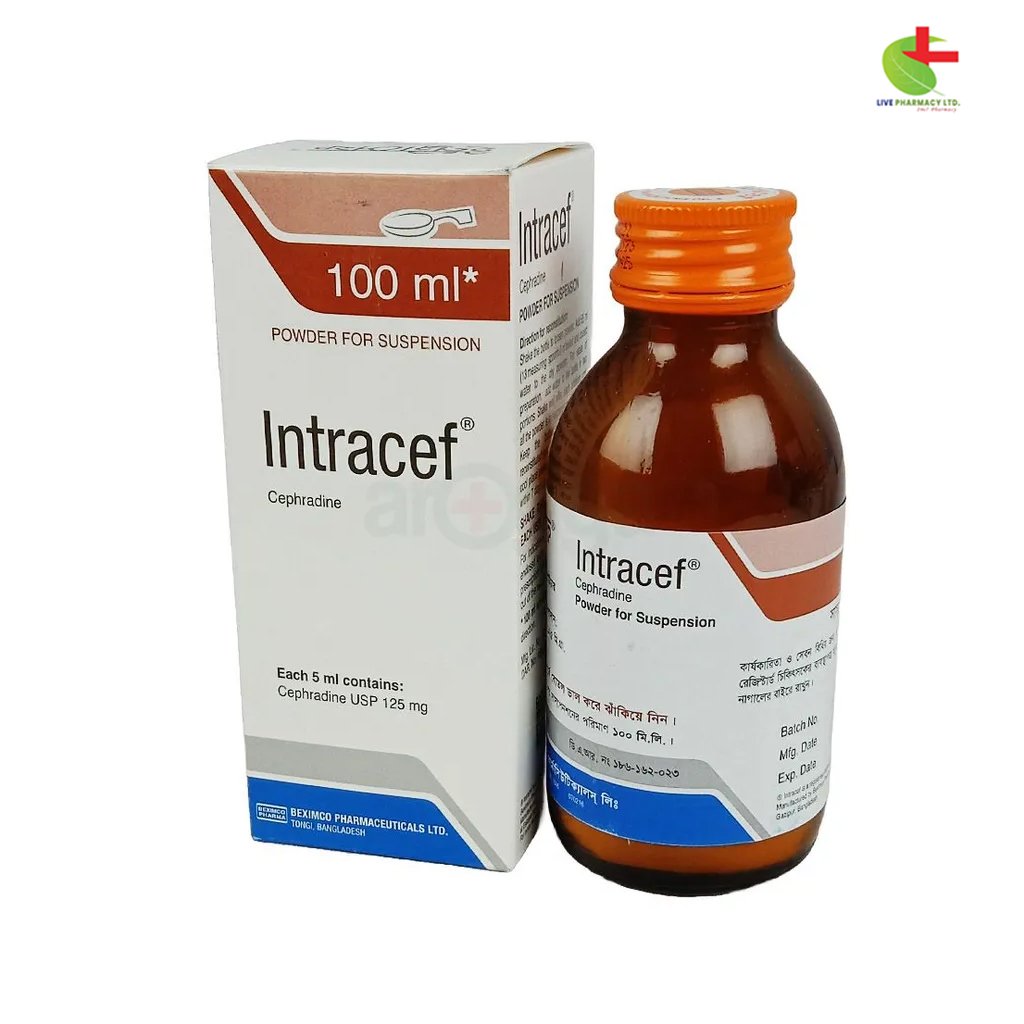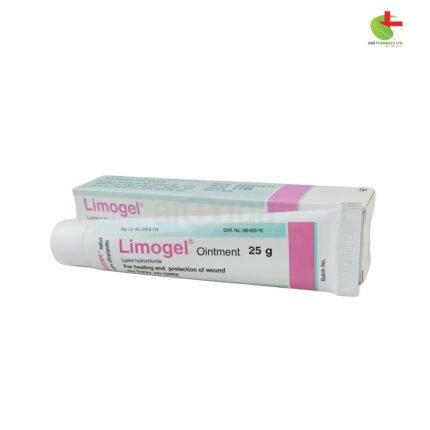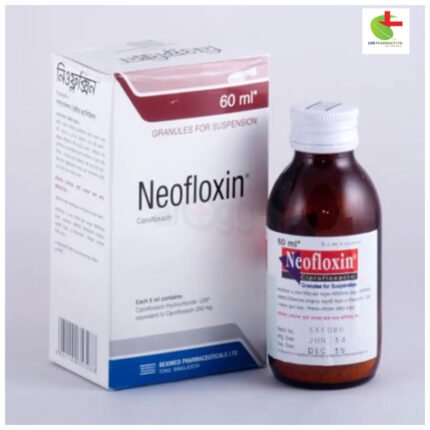Intracef PFS
80.00৳ Bottle (100 ml)
- Intracef is a broad-spectrum cephalosporin antibiotic.
- Effective against a range of Gram-positive and Gram-negative bacteria.
- Treats respiratory, urinary tract, skin, and soft tissue infections.
- Suitable for both adults and children, with dosage adjustments for renal impairment.
- Use under medical supervision, especially in those with hypersensitivity to cephalosporins.
 Brand
Brand
|
Beximco Pharmaceuticals Ltd |
|---|---|
 Generics
Generics
|
Cephradine |
 Type
Type
|
Powder for Suspension |
Indications
Intracef is prescribed for managing infections caused by susceptible Gram-positive and Gram-negative bacteria, including:
- Upper Respiratory Tract Infections: Sinusitis, pharyngitis, tonsillitis, laryngo-tracheo-bronchitis, and otitis media.
- Lower Respiratory Tract Infections: Acute and chronic bronchitis, lobar pneumonia, and bronchopneumonia.
- Urinary Tract Infections: Cystitis, urethritis, and pyelonephritis.
- Skin and Soft Tissue Infections: Abscesses, cellulitis, furunculosis, and impetigo.
Susceptible Microorganisms:
- Gram-Positive: Staphylococci (including both penicillin-sensitive and resistant strains, and penicillinase-producing species), Streptococci, Streptococcus pyogenes (beta-hemolytic), and Streptococcus pneumoniae.
- Gram-Negative: Escherichia coli, Klebsiella spp., Proteus mirabilis, Haemophilus influenzae, Shigella spp., Salmonella spp. (including Salmonella typhi), and Neisseria spp. Intracef is effective against many strains of E. coli and Staphylococcus aureus that produce penicillinase, which makes it resistant to ampicillin.
Pharmacology
Cephradine is a semisynthetic, broad-spectrum bactericidal antibiotic effective against a wide range of both Gram-positive and Gram-negative bacteria. It is active against both penicillinase-producing and non-producing staphylococci. Cephradine targets the bacterial cell wall, which contains peptidoglycan, inhibiting cross-linking and causing cell lysis due to osmotic pressure.
Dosage & Administration
For Oral Use:
Adults:
- Urinary Tract Infections: 500 mg four times daily or 1 g twice daily. Higher doses may be required for severe or chronic infections, including prostatitis and epididymitis.
- Respiratory Tract Infections: 250-500 mg four times daily or 500 mg-1 g twice daily, depending on infection severity and location.
- Skin and Soft Tissue Infections: 250-500 mg four times daily or 500 mg-1 g twice daily, depending on the severity.
Children:
- General Dosing: 25-50 mg/kg per day divided into two or four doses.
- Otitis Media: 75-100 mg/kg per day divided into doses every 6 to 12 hours.
- Maximum Daily Dose: 4 g.
Elderly: Standard adult doses are typically suitable. Monitor patients with impaired renal or hepatic function.
For Injectable Use:
Adults:
- Usual dose: 2-4 g daily in four divided doses, up to 8 g daily. For prophylaxis, administer a single dose of 1-2 g intramuscularly or intravenously before surgery.
Children:
- 50-100 mg/kg daily in four divided doses, up to 300 mg/kg daily for severe infections.
Note: Use medication according to the advice of a healthcare provider.
Interaction
Combining Intracef with nephrotoxic drugs (e.g., aminoglycosides) may increase the risk of kidney damage. Diuretics and probenecid may also heighten renal toxicity risks.
Contraindications
Intracef should not be used in patients with a known or suspected hypersensitivity to cephalosporins.
Side Effects
Common side effects include gastrointestinal disturbances. Hypersensitivity reactions may occur, particularly in those with a history of allergies, asthma, hay fever, or urticaria. Rare side effects include glossitis, heartburn, dizziness, chest tightness, nausea, vomiting, diarrhea, abdominal pain, vaginitis, and candida overgrowth. Other potential effects include:
- Blood Disorders: Thrombocytopenia, leucopenia, agranulocytosis, aplastic anemia, and hemolytic anemia.
- Immune System Disorders: Fever, serum sickness-like reactions, and anaphylaxis.
- Nervous System Disorders: Hyperactivity, hypertonia, dizziness, and rarely headaches.
- Hepatobiliary Disorders: Liver enzyme disturbances, transient hepatitis, and cholestatic jaundice.
- Renal Disorders: Reversible interstitial nephritis.
- Investigations: Possible elevation in blood urea nitrogen, serum creatinine, alanine aminotransferase, aspartate aminotransferase, total bilirubin, and alkaline phosphatase.
Pregnancy & Lactation
While animal studies have not shown teratogenic effects, the safety of Intracef during pregnancy has not been established. Cephradine is excreted in breast milk, so use caution in lactating mothers. Patients should be cautious about operating machinery or driving due to possible dizziness.
Precautions & Warnings
- Prolonged use may lead to superinfection due to resistant organisms.
- Use with caution in patients with penicillin sensitivity due to potential cross-sensitivity with beta-lactam antibiotics.
- Cephalosporins may cause false-positive results in Coombs’ testing or urine glucose tests.
- Adjust dosage for renal impairment.
- Contains lactose; avoid in patients with galactose intolerance, lactase deficiency, or glucose-galactose malabsorption.
Use in Special Populations
Renal Impairment:
- CrCl >20 ml/min: 500 mg every 6 hours.
- CrCl 5-20 ml/min: 250 mg every 6 hours.
- CrCl <5 ml/min: 250 mg every 50-70 hours.
For patients on chronic, intermittent hemodialysis:
- 250 mg at the start, 6-12 hours later, 36-48 hours after, and at the start of the next session if more than 30 hours have passed since the last dose.
General Note: Higher doses up to 1 g four times daily may be required for severe or chronic infections. Continue treatment for 2-3 days after symptoms resolve. For infections with hemolytic streptococci, continue for at least 10 days to prevent rheumatic fever or glomerulonephritis. Monitor bacteriological and clinical progress in chronic infections.
Overdose Effects
Symptoms of overdose are generally non-specific, including nausea, vomiting, diarrhea, and gastric discomfort. Supportive care is the main treatment, with gastric lavage recommended if a large quantity has been ingested.
Therapeutic Class
First-generation Cephalosporins.
Storage Conditions
Prepare Intracef Suspension fresh. Use reconstituted suspension within 7 days at room temperature or 14 days if refrigerated. Intracef Injection solutions should be used within 2 hours at room temperature or up to 12 hours if stored at 5°C. Discoloration of solutions from light to straw yellow does not affect potency. Do not use past the expiry date. Keep out of reach of children and dispense only with a physician’s prescription.













Reviews
There are no reviews yet.